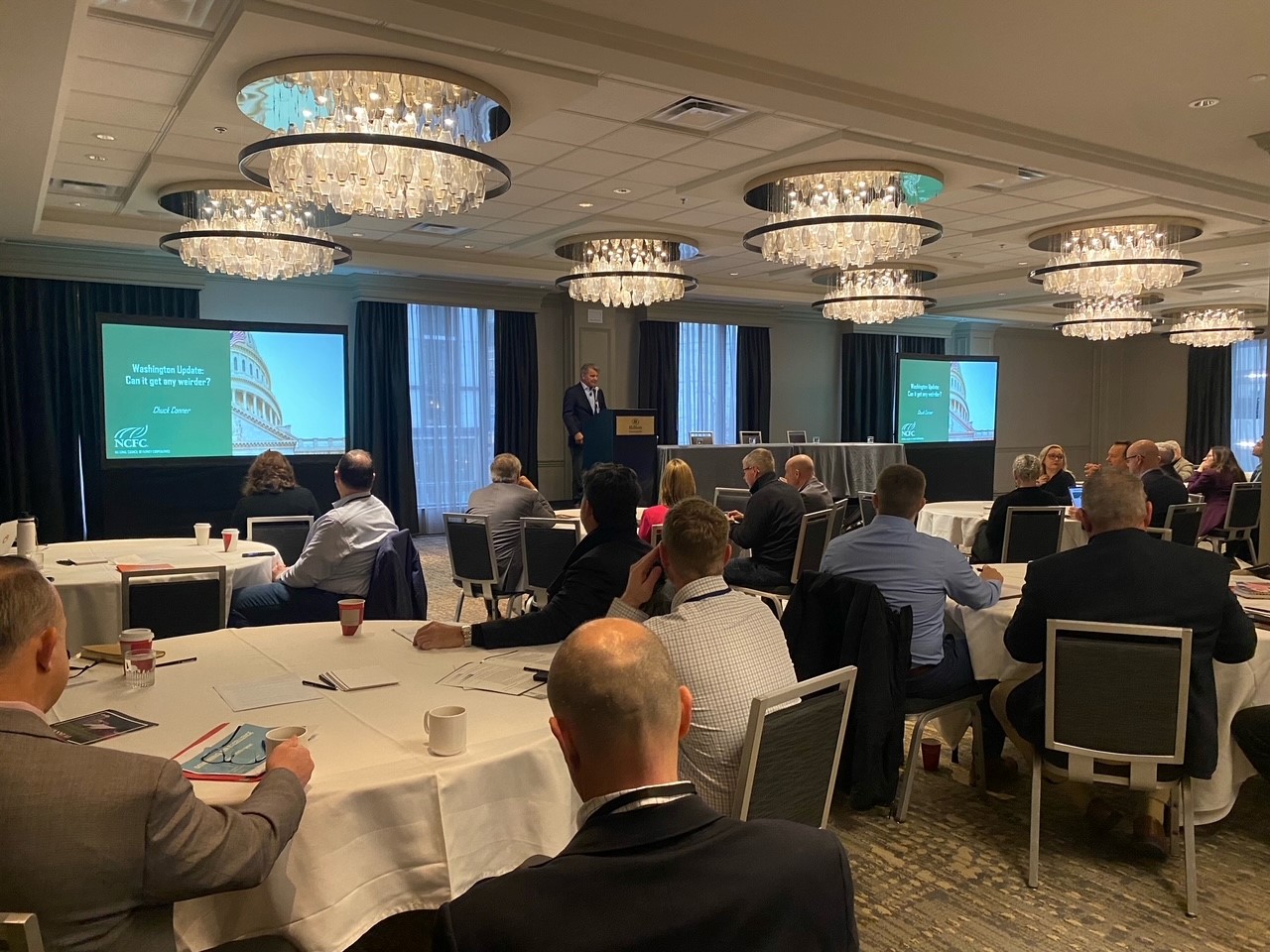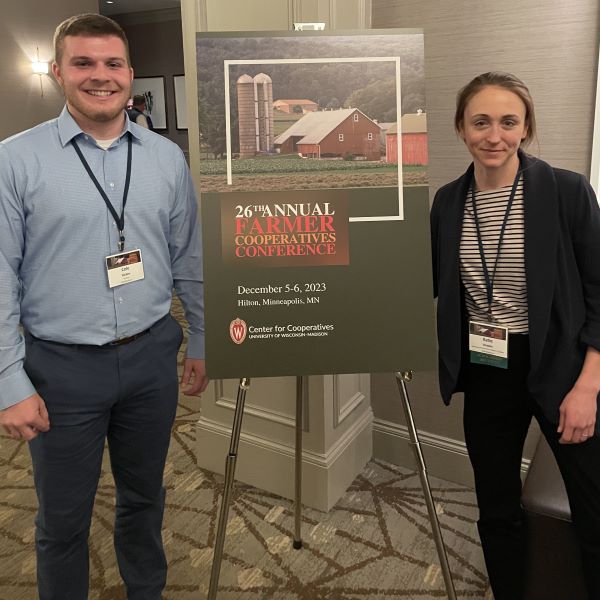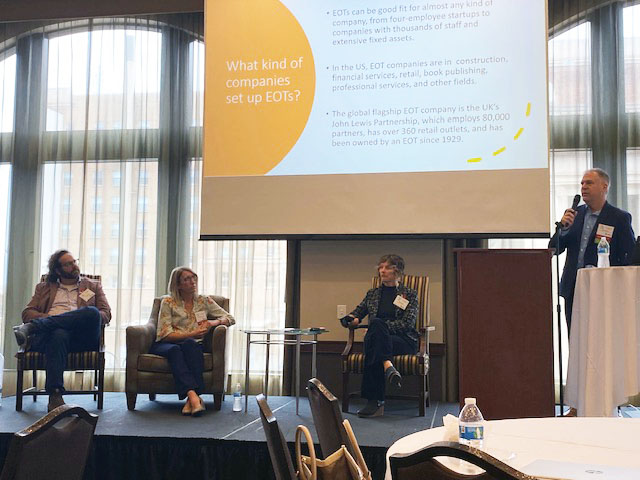|
|
|
Report on Food Co-op Governance Available
|
|
|
|
In 2021, the UW Center for Cooperatives (UWCC) launched the Cooperative Governance Research Initiative (CGRI) with the goal of generating robust data and insights about governance practices within and across U.S. cooperative sectors. The 2021 CGRI survey yielded responses from 500 cooperatives. Of those 500 cooperatives, over 100 were retail grocery cooperatives, also known as food co-ops.
|
|
|
|
This report highlights the dynamics and trends shaping governance practices in food co-ops. Some key findings include:
- On average, food co-ops have more diverse boards than CGRI participants in every dimension; however, they are less confident they have the right mix of directors and that demographics of the board reflect the membership. This lack of confidence is reflected in the finding that most food co-ops plan to prioritize board diversity in the next three years.
- When it comes to board recruitment, food co-ops are more likely to use a nominating committee than CGRI respondents as a whole. On average, food co-ops with nominating committees are more confident they have the right mix of directors than those without.
- Food co-ops are more likely than other CGRI participants to offer a diverse range of voting options and to hold open board meetings. Despite these efforts and the widespread use of strategies to promote member participation, food co-ops reported lower turnout at the last election and annual meeting and less confidence the board understands member needs.
Food co-ops apply many of the same governance practices as other sectors, yet they face industry-specific challenges such as increased market competition, thin margins, and pressure to deliver value to members and society in many dimensions. We hope this report inspires reflection and conversations that will help food co-ops achieve their potential today and into the future.
|
|
|
Stay tuned! Next Governance Survey is Coming in 2024!
The UWCC Research Team is gearing up for data collection on cooperative governance practices in 2024. This survey will build on the foundational research launched in 2021 and provide valuable data to benchmark and improve governance practces. Sign up for our mailing list to ensure that you stay well-informed about the UWCC's research on cooperative governance practices and are ready to participate in the survey when it becomes available.
|
|
|
|
|
|
|
|
|
|
|
Farmer Co-ops Gather in Minneapolis
|
|
|
|
The 26th Annual Farmer Cooperatives Conference returned to downtown Minneapolis, Minnesota, earlier this month. Attendees heard from their cooperative peers on topics such as managing member equity; labor programs such as flex labor and apprenticeships for formerly incarcerated individuals; policy implications including an analysis of the upcoming election year and the farm bill; cooperative risk management; the impact of ChatGPT and artificial intelligence on agriculture; and reflections on trends in agricultural cooperative governance practices.
|

|
Chuck Conner of National Council of Farmer Cooperatives presents on policy implications for farmer-owned cooperatives.
|
|
|
|
UWCC was pleased to bring students to the Farmer Cooperatives Conference through funding from the William and Harold Moy Young Leaders Scholarship Fund. The goal of the scholarship program is to recognize students who have the potential to make outstanding contributions to the cooperative and/or agribusiness sectors. This year two students attended and connected with agribusiness leaders.
|
|
|
|

|
Cole Hicken and Katie Strader attended the Farmer Cooperatives Conference with assistance from the William and Harold Moy Young Leaders Scholarship Fund.
|
Katie Strader is a graduate student at UW-Madison in the department of Agricultural and Applied Economics. Prior to starting graduate school, Katie worked full time on an organic farm in the Madison area. Her research will focus on the benefits of regenerative agricultural for Midwest farmers.
Cole Hicken is a senior at UW-Madison who will graduate shortly with a dregree in Agricultural and Applied Economics. Cole is interested in pursuing a career in agricultural lending and connected with farm credit partners at the conference.
|
|
|
|
|
|
|
|
|
WEDC Accepting Applications for Wisconsin Co-op Development Grants
|
|
|
|
The Wisconsin Economic Development Corporation (WEDC) is offering grants to support the development of new and existing cooperatives in Wisconsin with a goal of fostering the success of current and future cooperatives by supporting planning and exploratory research in advance of making a large investment.
In its first two years, the program successfully disbursed nearly $350,000 in grants to 17 cooperatives from across the state. Grant recipients represented a wide range of industries including agriculture, meat processing, child care, retail grocery, veterinary medicine, and assisted living.
WEDC has set aside up to $200,000 for each of the next two years (FY 24 and FY 25) with a $50,000 maximum per grant.
|
|
|
|
|
|
|
|
|
|
In Brief: Resources and Updates
|
|
|
|
|
Cooperative Veterinary Care Featured at WEDA Fall Best Practices Conference
|
|
|
|

|
Left to right: Eric Howlet, Samantha Forehand, Kristin Forde, and Steve Storkan present at the Wisconsin Economic Development Association Fall Best Practices Conference.
|
|
|
|
During the conference, Kristin used her expertise to explain the effectiveness of employee ownership in preserving businesses, jobs, and wealth within local communities. Her insights were informed by her close collaboration with Cooperative Veterinary Care, a partnership initiated in 2022 when UWCC was approached by the owners of two veterinary clinics in Spring Green and Mazomanie, Wisconsin, who were seeking guidance on how to convert their businesses to a worker-owned cooperative.
Under Kristin's guidance, the owners successfully transitioned the business to their employees, resulting in 21 eligible employees becoming co-op members at the time of conversion, with an impressive retention of 19 members to date. This success story serves as a testament to the viability of employee ownership as a strategic approach to business sustainability and community prosperity. You can read more about Cooperative Veterinary Care here.
|
|
Forestry Cooperative Grants Available
|
UWCC is pleased to invite proposals to receive $5,000 to $25,000 to fund the development of Wisconsin-based cooperatives or cooperative groups (e.g., associations, networks, and informal collaborations) in the following areas: forest management, forest-related products, biomass energy, forest-owner policy initiatives, and support for existing forestry cooperatives or associations. Proposals must be submitted by February 16, 2024. See the announcement and application for more details.
|
|
Preparing Future Co-op Employees
|
Earlier this year, UWCC staff and faculty from UW Madison’s Agricultural and Applied Economics Department (AAE) held three focus groups with leaders from Wisconsin agricultural cooperatives to identify content that could be added to current AAE course offerings to better prepare future cooperative employees and board members. The focus groups consistently identified the need for skills and knowledge in the following areas: understanding the role of cooperatives in the ag industry, business and financial acumen, the ability to work as part of a team, and communication skills. During the fall 2023 semester, two AAE faculty developed and delivered content related to these topics in AAE 215: Introduction to Agricultural and Applied Economics and AAE/ECON 421: Economic Decision Analysis. This spring, content on cooperatives will be also incorporated into AAE 419: Agricultural Finance. Thank you to the CHS Foundation for funding this valuable project.
|
|
UWCC Awarded Rural Cooperative Development Grant
|
UWCC has been awarded nearly $200,000 to provide technical assistance to rural cooperatives through the U.S. Department of Agriculture's (USDA) Rural Cooperative Development Grant (RCDG). The RCDG program exists to help rural cooperatives and small businesses form, expand, create jobs, and strengthen their capacity to serve rural citizens and communities. This grant enables UWCC to provide cooperative development services to rural clients in Wisconsin and throughout the upper Midwest. Types of assistance available include organizational development, cooperative education, board training, strategic planning, and support during feasibility and business planning activities. Key project areas include food systems; conversions to employee ownership; forestry; and childcare.
|
|
UWCC Staff News
|
|
|
|
|
Courtney Berner Awarded Beyster Fellowship
|
|
|
|
|
|
Wisconsin Cooperatives Highlighted in Canada
In October, Courtney Berner presented examples from Wisconsin co-ops at the Reimagining Rural Economic Development Conference in Alberta, Canada. Courtney collaborated with Dr. Clark Banack, Director of the Alberta Centre for Sustainable Rural Communities, while he visited rural cooperative ecosystems in the United States. Berner shared how cooperative conversions are being utilized to keep business, jobs, and wealth in communities. She also shared how factors such as bipartisan support for cooperatives and a wealth of service provides have been critical to the growth of the sector.
|
|
|
|
|
Kristin Forde Elected to Cooperation Works! Board of Directors
|
We're thrilled to announce that Kristin Forde has been elected to the Board of Directors for Cooperation Works! Kristin brings a wealth of expertise in fostering cooperative communities to this role. As a valued member of the board, Kristin will undoubtedly contribute to the organization's growth and impact. We look forward to witnessing the positive strides she will make in advancing cooperative principles and empowering communities through her service on the board.
|
|
|
|
|
|
Agricultural Cooperative Director Training
January 4-5, 2024 | Mankato, MN
UWCC is partnering with the University of Minnesota and Land O'Lakes to offer an in person training designed for agriculture and farm supply cooperative directors. Session topics will include strategic planning and thinking; effective co-op board advocacy and communication; and the changing nature of risk in regards to profitability. These small group trainings will include a mix of panel discussions and small group activities to maximize engagement.
|
|
|
Governance Training Series for New Directors
UWCC is pleased to offer its three-part series for new cooperative directors in early 2024.
Director Training 101: Roles and Responsibilities of Directors
January 23, 2024, 10:00 a.m.-3:30 p.m. | Stevens Point, WI
This session will focus on what cooperative governance is (and isn’t) and how as a director you can best fulfill your responsibilities to the cooperative in this role. In addition to the big picture, we will discuss specific tools that can help make directors and the board more effective.
Director Training 102: Finance Basics for Directors - Webinar
February 14, 2024, 1:00p.m.-3:00p.m. | Virtual
Monitoring the financial health of the organization is often the most intimidating responsibility assigned to co-op directors—but it doesn’t have to be! This session will provide an overview of cooperative finance, understanding the financial responsibilities of a director, reading financial statements, and questions directors should be asking.
Director Training 103: Tools for Governance Success
February 28, 2024, 10:00 a.m.-3:30 p.m. | Stevens Point, WI
Learn tools for improving the way your board meets its responsibilities to the cooperative and membership. Topics include: developing policy, GM/CEO evaluation, board evaluations, and meeting facilitation.
|
|
|
Credit Union Workshop
January 26, 2024 | Online, Zoom
|
|
|
CCMA 2024 Coming to Portland, Maine!
May 30 - June 1, 2024 | Portland, Maine
We are thrilled to bring CCMA back to the East Coast! CCMA 2024 will be in Portland, Maine. We are already working hard with our co-op host, Portland Food Co-op, to create a program that inspires and gives food co-op leadership the tools they need to serve their co-op and community. We are excited to bring CCMA to Maine for the first time in CCMA’s nearly 70-year history. Maine boasts a vibrant and connected co-op ecosystem that is developing a new generation of cooperative enterprises addressing the needs of Mainers. Check back with us periodically for updates on the conference program.
|
|
|
|
|
|
|
|
|